Ata-ul-Haye Nasir, Ahmadiyya Archive & Research Centre
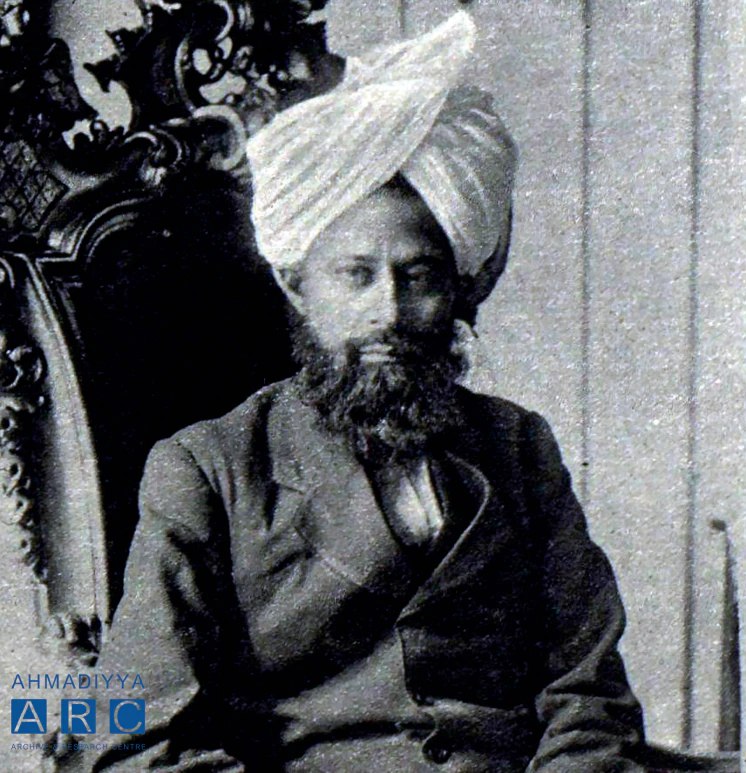
The Cabinet Mission and Hazrat Musleh-e-Maud’sra guidance
In March 1946, the British government sent a delegation to India, commonly known as the “Cabinet Mission”, to discuss the transfer of powers from the British government to the Indian leadership.
Upon this, Hazrat Mirza Bashiruddin Mahmud Ahmad, Khalifatul Masih IIra wrote an article, titled Parliamentary Mission Aur Hindustanion Ka Farz, which was published in the 6 April 1946 issue of Al Fazl. Its English translation was published in the May 1946 issue of The Review of Religions, titled The Cabinet Mission and the Duty of Indian Leaders.
In this article, Huzoorra granted valuable guidance to the Mission and the Indian leaders. While advising the government, he said:
“My advice to the Mission, therefore, is that they should endeavour to find a solution to the problems of India not merely on the basis of political policies but on the basis of moral principles so that if their decision should cause unrest or agitation in the country they should not flourish for any length of time.” (The Review of Religions, Vol. 45, p. 79, May 1946)
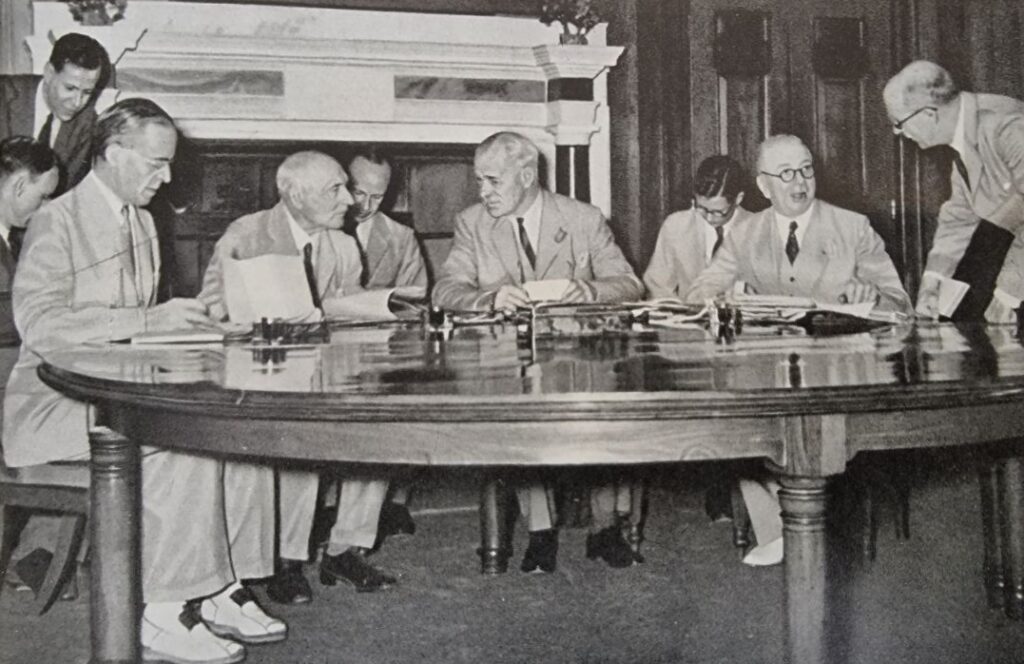
The talks between the Cabinet Mission and Indian leaders
After the first round of talks between the Mission and Indian leaders, two options were on offer:
“The option which the Mission preferred was to keep an unitary India with a loose federation and a centre restricted to defence and foreign affairs. The second was to concede a sovereign but truncated Pakistan consisting of Muslim majority-districts in the north-west (that is, western Punjab, Sind, NWFP, and Baluchistan) and the north-east (eastern Bengal without Calcutta, but with the Sylhet district of Assam). This sovereign Pakistan would, moreover, be expected to make a treaty of alliance, for both offensive and defensive purposes, with Hindustan.” (The Sole Spokesman: Jinnah, the Muslim League and the Demand for Pakistan, by Dr Ayesha Jalal, Sang-e-Meel Publication, p. 183)
On 11 April 1946, these two options were presented to the Cabinet in London.
“The Cabinet was asked to decide whether it would be prepared to deny the central article of the British Indian creed, vital to its traditional conception of metropolitan interests in South Asia. The decision to be ready to tear the seamless web of Indian unity, which the British had taken more than a century and a half to weave, was taken at one short meeting of the Cabinet. However much they preferred Scheme A [unitary India], the Cabinet agreed that if Scheme B [truncated Pakistan] was the only hope of an agreed settlement, then Scheme B it would have to be.” (Ibid, pp. 184-185)
The Congress expressed on 15 April 1946 that they wanted an undivided India, but Jinnah wanted a completely sovereign Pakistan. The mission had more meetings with the Indian leaders in Simla between 5 to 12 May, but achieved no success.
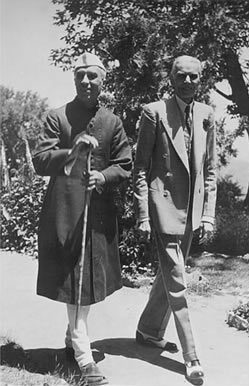
On 13 May 1946, during an interview with the Viceroy Lord Wavell, MA Jinnah said, “The whole guts” of the problem lay in the grouping of the Muslim Provinces, if this was once agreed, we might be able to get on. (The Transfer of Power, Vol. VII, p. 540)
The Viceroy then went on to sound Jinnah about the Interim Government and told him, he should have to get on with its formation as soon as possible, and that he had already sounded Congress. (Ibid)
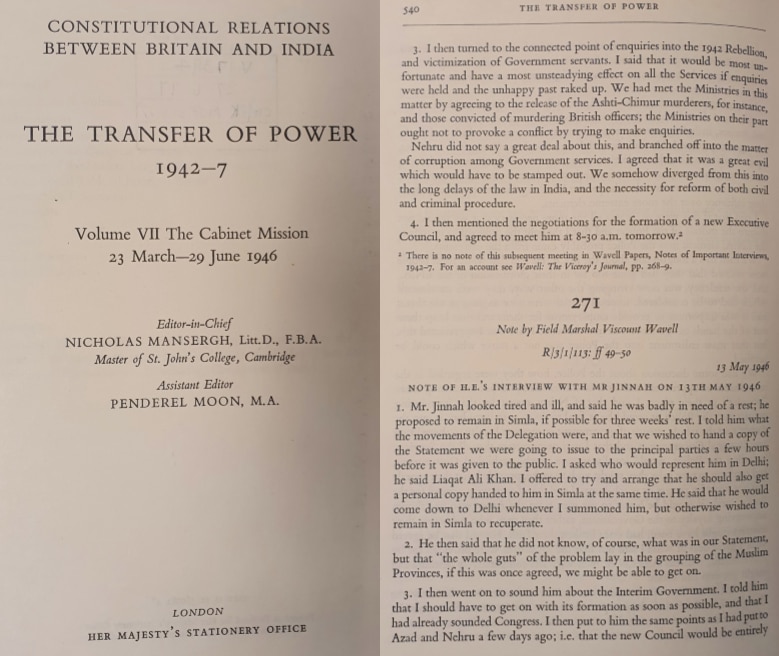
The announcement of the Cabinet Mission Plan
After a dialogue of nearly two months, the Cabinet Mission and the Viceroy of India issued a statement on 16 May.
During this statement, it was stated:
“After prolonged discussions in New Delhi we succeeded in bringing the Congress and the Muslim League together in conference at Simla. There was a full exchange of views and both parties were prepared to make considerable concessions in order to try and reach a settlement, but it ultimately proved impossible to close the remainder of the gap between the parties and so no agreement could be concluded. […]
“We have accordingly decided that immediate arrangements should be made whereby Indians may decide the future constitution of India, and an Interim Government may be set up at once to carry on the administration of British India until such time as a new Constitution can be brought into being. […]
“We therefore examined in the first instance the question of a separate and fully independent sovereign state of Pakistan as claimed by the Muslim League. […] The argument for a separate state of Pakistan was based, first, upon the right of the Muslim majority to decide their method of Government according to their wishes, and, secondly, upon the necessity to include substantial areas in which Muslims are in a minority, in order to make Pakistan administratively and economically workable.” (The Indian Annual Register, January-June 1946, Vol. I, pp. 144-145)
The statement further went on to state the geographical and administrative factors, which they thought to be the concerning points in accepting the concept of a sovereign Pakistan. The statement said:
“We are therefore unable to advise the British Government that the power which at present resides in British hands should be handed over to two entirely separate sovereign States. This decision does not, however, blind us to the very real Muslim apprehensions that their culture and political and social life might become submerged in a purely unitary India, in which the Hindus with their greatly superior numbers must be a dominating element.” (Ibid, p. 146)
Further, the Mission outlined a solution in regard to the constitutional matters, and stated:
“There should be a Union of India, embracing both British India and the States, which should deal with the following subjects: Foreign Affairs, Defence, and Communications; and should have the powers necessary to raise the finances required for the above subjects.” (Ibid, pp. 146-147)
The Mission’s statement then indicated the constitution-making machinery to work out a new constitution.
The statement was also read out in the British Parliament on the same day, by the Secretary of State for Dominion Affairs, Viscount Addison.
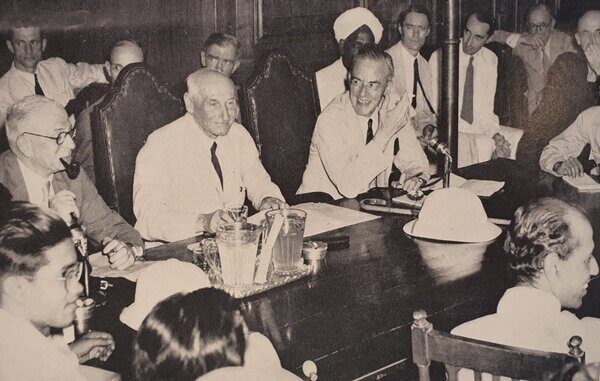
During his Friday Sermon on 24 May 1946, Hazrat Khalifatul Masih IIra stated:
“The members of the Jamaat are aware that a few days ago, the Cabinet Mission had announced a scheme in regard to the settlement between the Hindus and Muslims. This decision is under consideration of different communities, and they are pondering over those aspects which will affect them in the future. […] As far as the Muslim League is concerned, its standing has degraded as per this decision, since it has not been granted those rights, which it had demanded. […]
“As far as I have pondered over this scheme, in my view, there are certainly such flaws that it cannot ensure the protection of the Muslims’ rights completely. In other words, considering the current circumstances of the country and sentiments held by the people towards each other, the rights of the Muslims cannot be completely protected.” (Al Fazl, 3 June 1946, pp. 1-2)
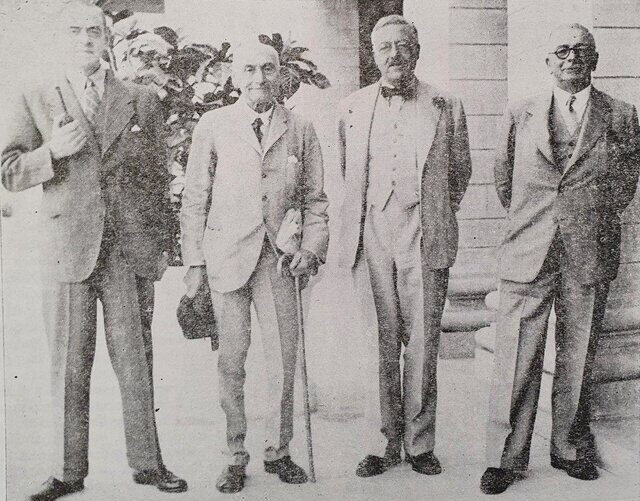
Huzoorra then went on to outline the flaws of this scheme and granted guidance to the government and Indian leaders as well.
Huzoorra continued:
“Undoubtedly, a nation cannot succeed without morals, […] and it cannot conquer any other nation without inculcating the national character [amongst its people]. […] This is a negligence of the Muslims that they have always raised the political voice, but never focused on those matters which are necessary for a nation’s real success.” (Al Fazl, 3 June 1946, pp. 3-4)
Interim Government
When discussions regarding the formation of an Interim Government began, Jinnah asked the Viceroy during a meeting on 3 June what the course of action would be if one party agreed to accept the Cabinet Mission’s Statement of 16 May, while the other did not. The Viceroy responded in a letter dated 4 June:
“I can give you on behalf of the Cabinet Delegation my personal assurance that we do not propose to make any discrimination in the treatment of either party; and that we shall go ahead with the plan laid down in the Statement so far as circumstances permit if either party accepts; but we hope that both will accept.” (The Indian Annual Register, January-June 1946, Vol. I, pp. 180-181)
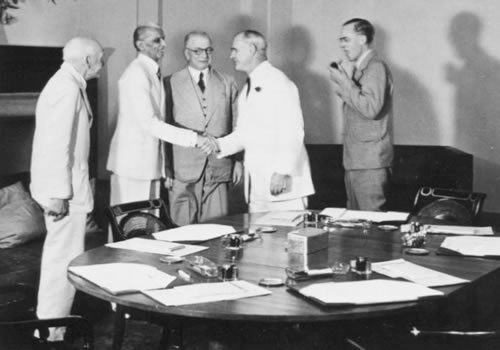
The Cabinet Mission issued a statement on 16 June, and said:
“His Excellency the Viceroy, in consultation with the members of the Cabinet Mission, has some time been exploring the possibilities of forming a coalition Government drawn from the two major parties and certain of the minorities. The discussions have revealed the difficulties which exist for the two major parties in arriving at any agreed basis for the formation of such a Government. […] It is indeed urgently necessary that a strong and representative Interim Government should be set up to conduct the very heavy and important business that has to be carried through.” (Ibid, p. 170)
The Viceroy named 14 members for the Interim Government, and stated, “If any of those invited is unable for personal reasons to accept, the Viceroy will, after consultation, invite some other person in his place.” (Ibid)
The Viceroy also sent a letter to the presidents of Congress and Muslim League, which included the above-mentioned statement.
Hazrat Sir Chaudhry Muhammad Zafrulla Khanra stated:
“The Cabinet Mission earnestly got down to its work despite Delhi’s unusually hot summer and spared no effort in achieving its objective. […] The Muslim League and the Congress both agreed on the final shape of the plan proposed by the Mission. The Quaid-e-Azam had some problem in securing the consent of the League’s council but it gave in and approved the Mission’s proposals. The country heaved a sigh of relief after years of conflict and effort – but it was not to last.” (Tehdise Nemat or Recollection of Divine Favours [English], p. 514)
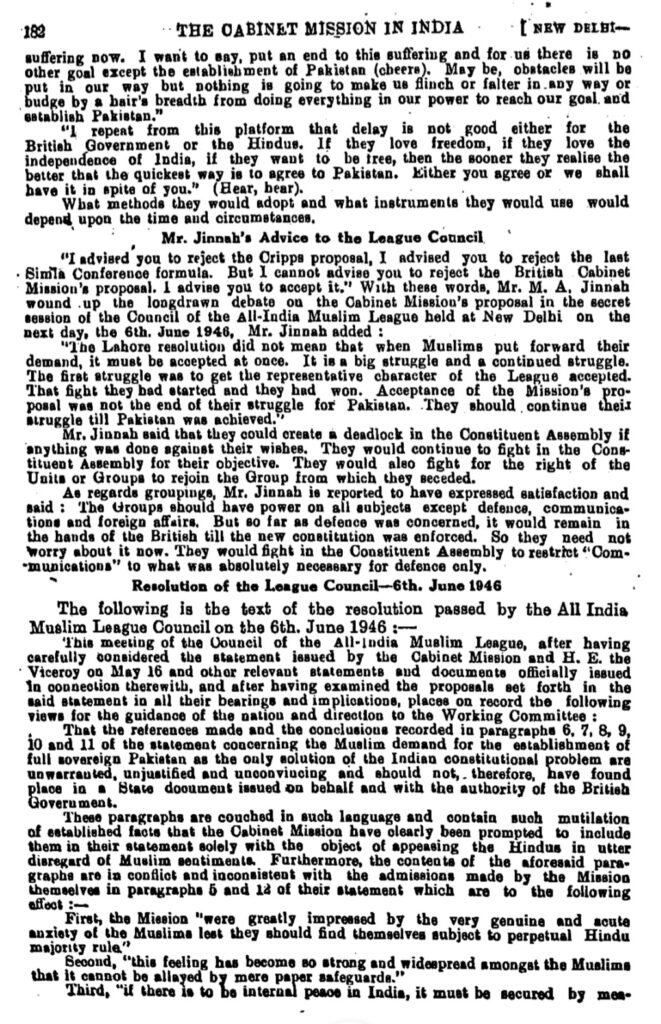
The Muslim League had passed a resolution on 6 June 1946 and announced:
“That with regard to the arrangements for the proposed Interim Government at the Centre, this Council authorises its President to negotiate with H. E. the Viceroy and to take such decisions and actions as he deems fit and proper.” (The Indian Annual Register, January-June 1946, Vol. I, pp. 182-183)
However, the president of the Indian National Congress wrote a letter to the Viceroy on 24 June, saying:
“After full consideration and deliberation they [members of the Congress Working Committee] have been reluctantly obliged to decide against the acceptance of the Interim Government proposals as framed by you.” (Ibid., 173)
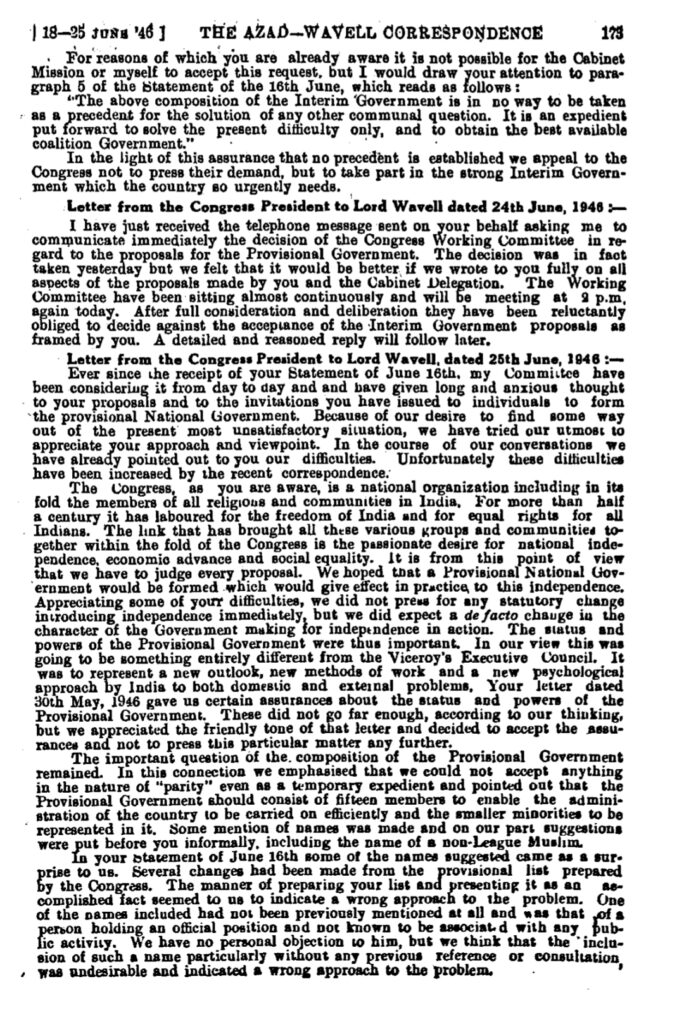
At that time, Hazrat Khalifatul Masih IIra stated:
“Though Congress has accepted the scheme of the parliamentary mission in regard to the permanent system, it has rejected the suggestion regarding an interim government. The mission had announced that if any party would not accept its suggestions regarding the interim government, even then it would form the government. According to this announcement, it is now its [the Mission’s] obligation to form an interim government with the cooperation of other parties, save the Congress.” (Al Fazl, 28 June 1946, p. 3)
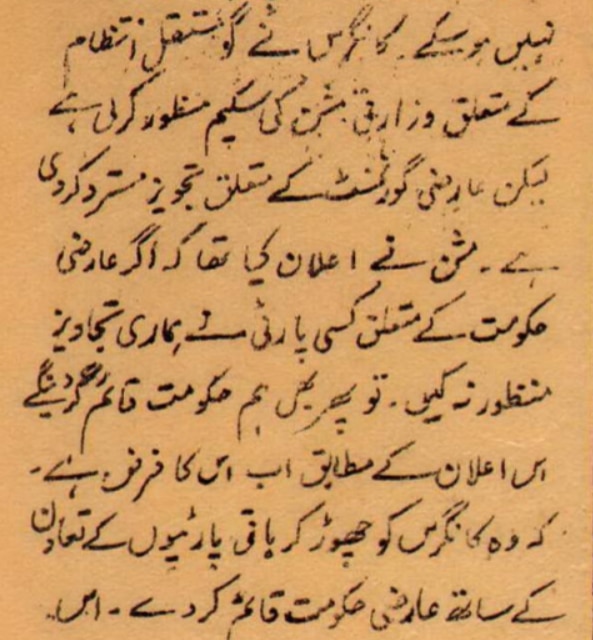
Hazrat Sir Chaudhry Muhammad Zafrulla Khanra said:
“Some elements in the Congress had agreed to accept the Cabinet Mission Plan in the expectation that the Muslim League would reject it and responsibility for the failure would lie on the League and weaken the demand for Pakistan in the eyes of the British. Once the Muslim League accepted the plan, the Congress started looking for ways to scuttle it.” (Tehdise Nemat or Recollection of Divine Favours [English], p. 517)
On 29 June, the Cabinet Mission, along with their staff members, returned to London.
On 18 July, the Secretary of State for India said in the House of Lords that the Viceroy would resume his negotiations with the Congress and League, in order to resolve the new conflict. (Hansard, HL Deb 18 July 1946, Vol. 142, cc. 579-636, https://api.parliament.uk/historic-hansard)
On the same day, Sir Stafford Cripps, a member of the Cabinet Mission, briefed the House of Commons about the efforts of the Mission to propose a reasonable plan for India. (Hansard, HC Deb 18 July 1946, Vol. 425, cc. 1394-448, https://api.parliament.uk/historic-hansard)
While appreciating the efforts by the Cabinet Mission, Hazrat Sir Chaudhry Muhammad Zafrulla Khanra stated:
“They did a first-class job and to the gratified surprise of everybody, they did bring a settlement between the two political parties. […] It is much to be regretted that the plan after being accepted was sabotaged by Pandit Jawaharlal Nehru’s announcement within a few weeks, putting an interpretation upon certain paragraphs of the plan, which those paragraphs were utterly incapable of bearing.” (The Reminiscences of Sir Muhammad Zafrulla Khan, p. 136)
He further said:
“I greatly admired Mr Jinnah’s strategy that having pushed the matter as far as it was possible for it to go, he was willing to try an alternative which seemed to him feasible and practicable. Then that plan was wrecked – I am afraid quite deliberately – by Mr Nehru, who had, shortly after the plan was accepted by both sides, become President of the Congress, and as President made authoritative statements which were utterly inconsistent with the clear wording of the Cabinet Mission’s Plan.” (Ibid, p. 161)
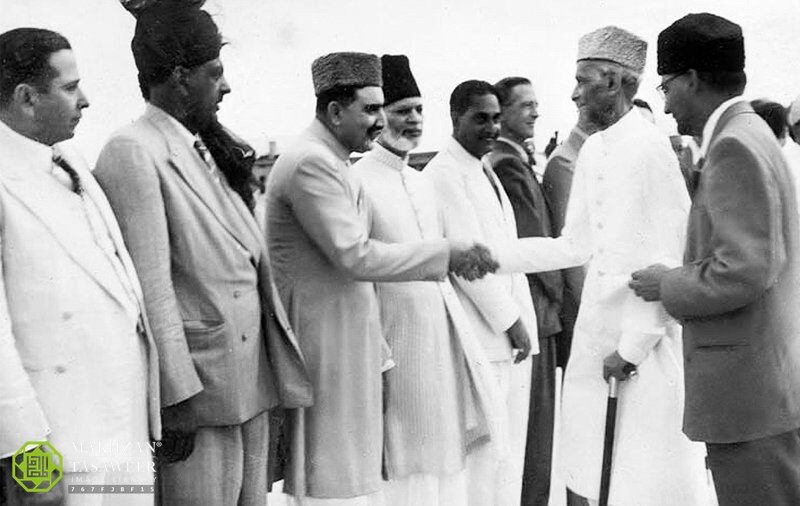
The deadlock
The Muslim League held a session on 27 to 29 July, where Jinnah said that the Cabinet Mission and the Viceroy had gone back on their word and had abandoned the formation of the Interim Government. Consequently, the league passed a resolution in which they decided to reject the Cabinet Mission Plan, and to hold ‘Direct Action Day’ on 16 August 1946. (The Indian Annual Register, July-December 1946, Vol. II, pp. 167-177)
Consequently, the Congress saw it as their best chance to dominate and passed a resolution on 10 August, in which they announced to partake in the Interim Government. (Ibid, pp. 219-220)
On 12 August, a communique was issued from the Viceroy’s House that “His Excellency the Viceroy, with the approval of His Majesty’s Government, has invited the President of the Congress to make proposals for the immediate formation of an Interim Government, and the President of the Congress has accepted the invitation.” (Ibid, p. 221)
On 24 August, a communique was issued to announce the appointment of the Interim Government, which would take office on 2 September. The Viceroy stated in a broadcast that the offer was still open for the Muslim League as well.
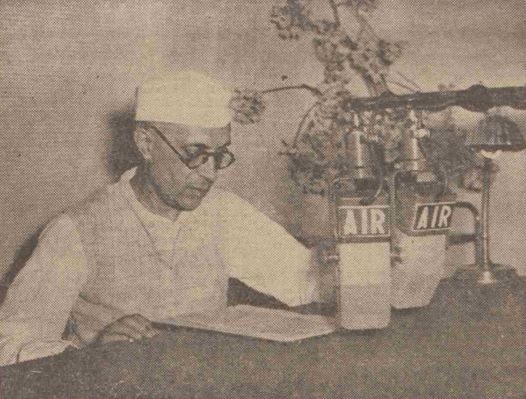
A new hope in Delhi
The deadlock continued to shatter the hopes for a conciliation between the two parties, but then a new hope arose when talks between the Muslim League, Congress and the government resumed in Delhi towards the end of September.
Hazrat Musleh-e-Maudra went to Delhi on 22 September, where prominent political leaders, including Jinnah and Gandhi, and some journalists as well, had meetings with him.
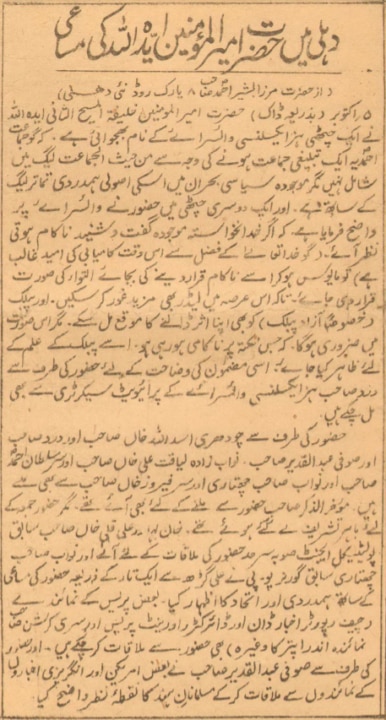
On 5 October, Huzoorra sent a letter to the Viceroy of India Lord Wavell and stated that though Jamaat-e-Ahmadiyya is a religious Jamaat and is not a part of the Muslim League as a whole, during the current political turmoil, the Jamaat’s sympathies and support were with the Muslim League. (Al Fazl, 7 October 1946)
In the second letter, Huzoorra wrote to the Viceroy that if the talks ended without any solution, then instead of being disappointed, more time should be given to finding a solution for this conflict. Moreover, Hazrat Maulvi Abdur Rahim Dardra met with the private secretary to the Viceroy, on Huzoor’s behalf.

Huzoorra wrote the third letter to the Viceroy, at a time when on the evening of 10 October, talks between the Muslim League and Congress took a delicate turn and seemed to be unsuccessful again. Moreover, Huzoorra instructed the Jamaat to pray in this regard, during his Friday Sermon on 11 October 1946. Huzoorra said:
“[The members of] our Jamaat should not only themselves pray, but also urge everyone whom they meet and emphasise to them the need to specially pray during these days. […] It is the duty of our Jamaat to urge people towards prayers, and as a result, the enmity and grudge which is held by the Muslims and Hindus towards each other, will also reduce.” (Al Fazl, 30 October 1946, p. 2)
On 6 October 1946, Hazrat Musleh-e-Maudra wrote a letter to Jinnah, in which he said:
“I am very glad to hear that after all the present negotiations are nearing a settlement. I have all along been of the opinion that though we should never lose sight of our ideal or slacken our struggle for it we should at the same time be ready to accept a compromise (for Islam allows compromise on such occasions) provided it is honourable and leaves us free to continue lawful struggle for further achievement. […] As the interim government has immense power for good and evil I was naturally very anxious that some way might be found for the Muslims to get in and I am glad that your good handling of the situation and the co-operation of influential friends have made that possible.” (Tarikh-e-Ahmadiyyat, Vol. 10 [Zamima])
A new settlement
With Huzoor’sra efforts, this matter moved towards its solution and the Muslim League agreed to cooperate in regard to the Interim Government without compromising their initial demands and informed the Viceroy on 13 October.
The Civil and Military Gazette reported:
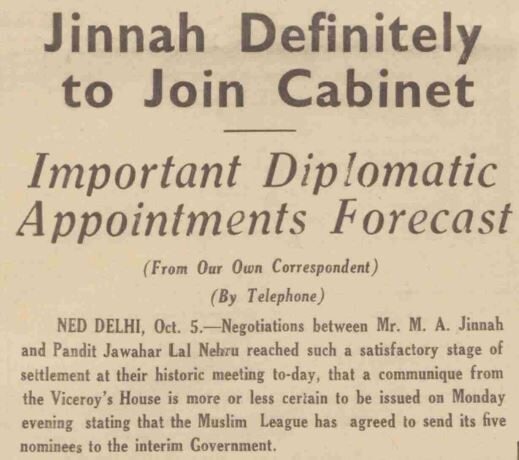
“Jinnah Definitely to Join Cabinet
“Important Diplomatic Appointments Forecast
“(From Our Own Correspondent)
“(By Telephone)
“NEW DELHI, Oct. 6. – Negotiations between Mr. M. A. Jinnah and Pandit Jawahar Lal Nehru reached such a satisfactory stage of settlement at their historic meeting today, that a communique from the Viceroy’s House is more or less certain to be issued on Monday evening stating that the Muslim League has agreed to send its five nominees to the interim Government.” (The Civil and Military Gazette, 6 October 1946, p. 1)
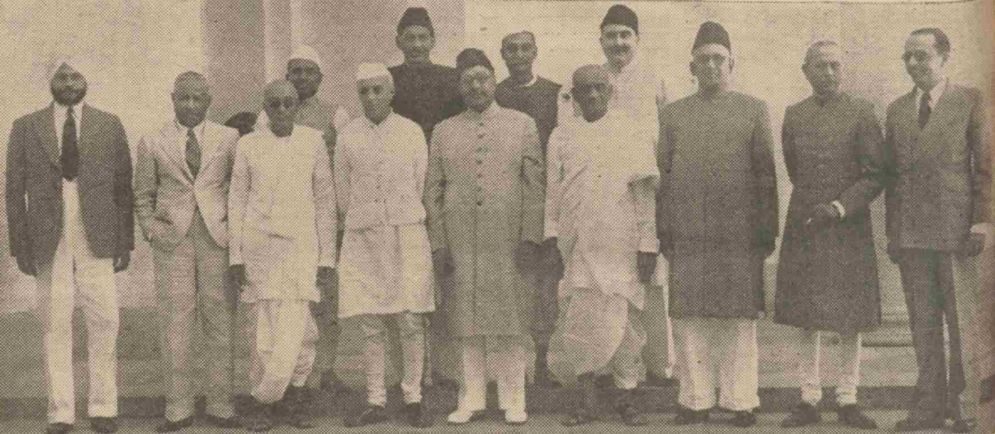
A communique was issued by the government on 15 October, which announced the appointment of five new members for the Interim Government. It stated:
“The Muslim League have decided to join the Interim Government, and His Majesty the King has been pleased to appoint the following to be Members of the Interim Government: Mr Liaquat Ali Khan, Mr I.I. Chundrigar, Mr Abdur Rab Nishtar, Mr Ghazanfar Ali Khan and Mr Jogendra Nath Mandal. […]
“The distribution of portfolios will be settled early next week and the new Members will then be sworn in.” (India Steps Forward: The Story Of The Cabinet Mission In India In Words & Pictures, by Jag Parvesh Chander, The Indian Printing Works, Lahore, 1946, p. 273)
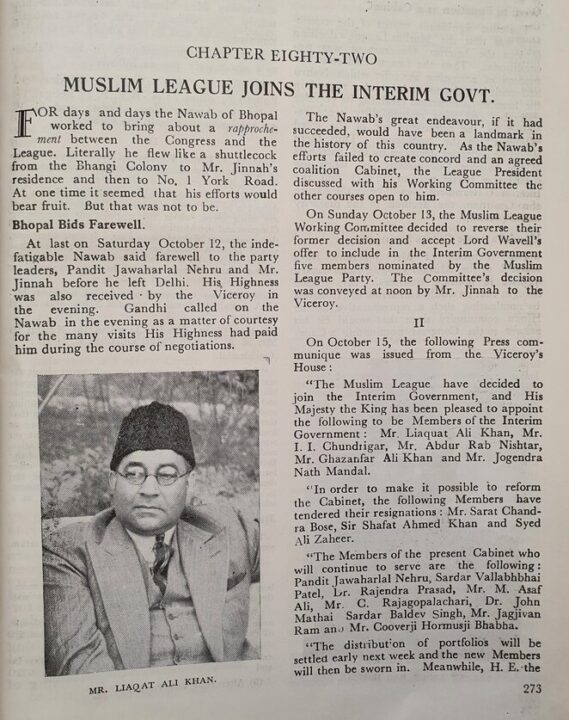
In this regard, a prominent Indian jurist, HM Seervai stated:
“An Interim Coalition Government born of resentment, bitterness and a sense of humiliation felt by the Muslim League did not augur well for harmonious working either of the Interim Government or of the Constituent Assembly. Nehru wanted to be treated as a de facto Prime Minister – a claim resisted by Liaquat Ali Khan and the nominees of the League. The matter was further aggravated by the fact that the League came into the Interim Government on the understanding that the League would revoke its Resolution of 29 July 1946 withdrawing its acceptance of the Plan, and it had not done so.” (Partition of India: Legend and Reality, Oxford University Press, 2005, p. 83)

During his Friday Sermon on 18 October 1946, Huzoorra narrated the reasons for which he had travelled to Delhi and also stated some details of his meetings with the political leaders.
While mentioning his meeting with MK Gandhi, Huzoorra said:
“I had a meeting with Mr Gandhi as well, and my objective was to tell him in detail that the disagreement [between the Congress and Muslim League] is of no benefit, therefore, the Congress and League both need to sacrifice some of their demands, so that the country’s disorder may not take a more dangerous turn.” (Al Fazl, 13 November 1946, p. 5)
When the allotment of portfolios was announced, Huzoorra wrote a letter to Jinnah on 27 October 1946, and stated:
“The new allotment of portfolios has been announced. Though their distribution is not equitable yet I must congratulate you on your successful efforts. The important portfolios like Defence, External Affairs, Home etc. are still with the Congress. One of them especially the Defence or the Supply ought to have been given to the Muslim League. However, the Muslim League representatives will follow your advice and work assiduously till the rights of Muslims are fully secured. May Allah help you in your great task and lead you to the right path. Amin.” (Tarikh-e-Ahmadiyyat, Vol. 10, p. 464)
The Viceroy, Lord Wavell noted in his diary on 30 October 1946:
“I am very doubtful whether this Coalition will work, too much time has been wasted and things are moving too fast. The Congress is not interested in making a Constitution under British auspices, only in consolidating their power. The mission gave away the weakness of our position, and our bluff has been called.
“Our time in India is limited and our power to control events [is] almost gone. We have only prestige and previous momentum to trade on and they will not last long. My task now is to secure the safest and most dignified withdrawal possible.
“I am sorry for the Muslims, they have more honesty, courage and dignity than the Hindus, but cannot stand up to the power of the rupee and the superior education and chicanery of the Congress. Up to a point Jinnah played his cards well, but I think he has been too unyielding.” (Wavell: The Viceroy’s Journal, by Penderel Moon, Oxford University Press, p. 368)
Another conflict
Meanwhile some issues arose in regards to the Interim Government’s functioning and authority.
HM Seervai stated:
“The Congress’s claim that the Interim Government should function as a Cabinet, with Nehru as a de facto Prime Minister, raised questions not only of the constitutional position of the Executive Council under the GI Act, 35, but also of the Muslim League’s attitude to such a claim. The Muslim League saw in that claim an attempt by the Congress to seize absolute executive power by eliminating the Viceroy’s veto, and then dealing with the Muslims as an all powerful Cabinet. The Muslims, therefore, opposed the claim; and the British Government also rejected that claim by declining to go beyond the assurances given to [Maulana Abul Kalam] Azad.” (Partition of India: Legend and Reality, Oxford University Press, 2005, p. 80)
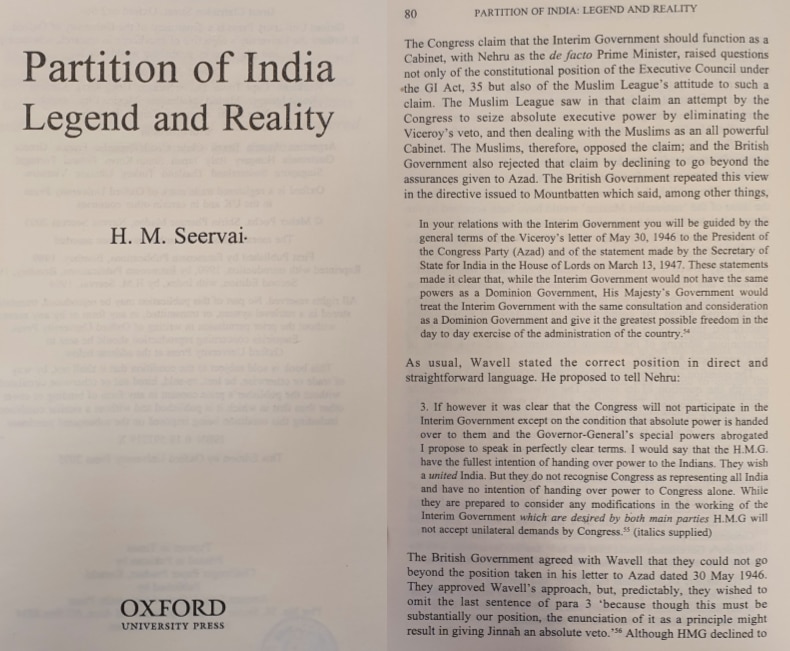
Nehru wanted to hold the Constituent Assembly’s session on 9 December 1946, but the Viceroy denied this by saying it was not the appropriate time. Moreover, Jinnah also wrote to the Viceroy to postpone the session.
“Wavell was of the view that till the Congress had categorically accepted the Mission’s interpretation of the grouping provisions of the Plan, the Constituent Assembly should not be called. But he was overruled by H.M.G., and he issued invitations on 20 November for the convening of the Constituent Assembly on 9 December 1946. This provoked a sharp reaction from Jinnah.” (Ibid, p. 85)
Thereafter, Jinnah announced on 21 November that “no representative of the Muslim League will participate in the Constituent Assembly.” (The Indian Annual Register, July-December 1946, Vol. II, pp. 277-279)
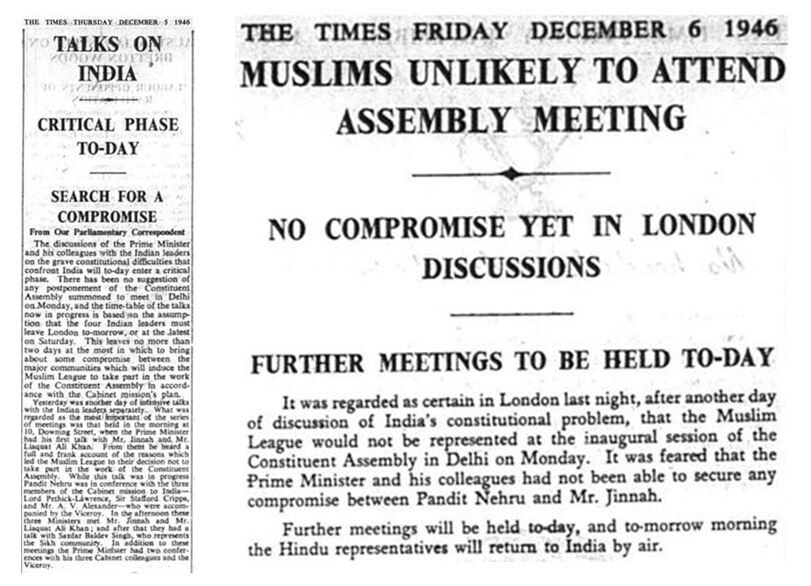
Talks in London
Clement Attlee called several Indian leaders to London for consultation over the ongoing conflict, where round table meetings were held to settle the dispute.
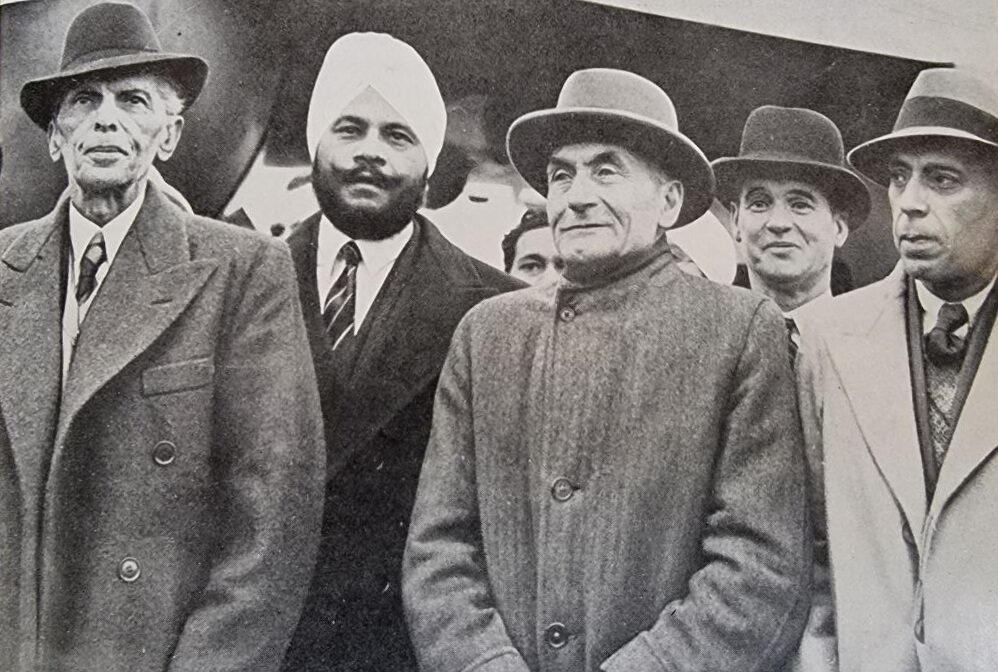
At that time, Hazrat Musleh-e-Maudra sent a message to Mr Attlee, which was conveyed to him by Chaudhry Mushtaq Ahmad Sahib Bajwa, then Imam of the London Mosque, in a letter dated 8 December 1946. The letter read:
“I have the pleasure of placing before you a copy of the cable from Hazrat Mirza Bashir-ud-Din Mahmud Ahmad, Head of the Ahmadiyya Community, in compliance with his instructions.
“‘Put before the Prime Minister the Ahmadiyya view that the League descended from the Pakistan claim only on assurance by the British Government about the grouping of Provinces and the remedy of Court decision, if differences about interpretation of Government declaration occur. The League is sticking to the position while Congress is going back on its words. If at this question a break occurs and the Government sides with the Congress it only means that the Government has made a party with Congress to deceive Muslims and bring them down by degrees. That will be disastrous for the British also, for that will mean that no reliance should be put on British words. Our Community is a religious one but we have suffered death, arson; looking along with other Muslims in Bengal, Bihar, UP and Bombay we cannot sit idle. We therefore appeal to British justice and fairness not to be a party to this gradual bringing down policy. You may be believing or not but there is surely One God, ruling over the Universe. I draw your attention to Him. He does not care for politics. He looks only to the honesty of purpose and truthfulness. May God save you from breaking your words and the resulting punishment.’” (File)
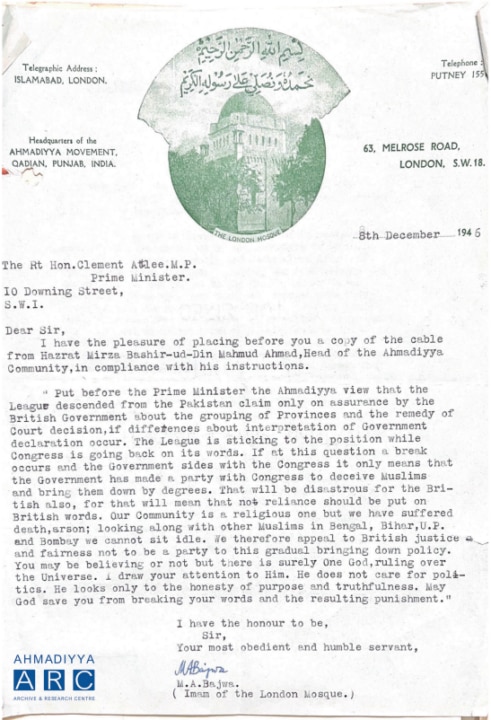
Indian Daily Mail reported:
“Mushtaq Ahmad Bajwa, Imam of Putney Mosque, told Reuter yesterday that he had passed a letter to the Prime Minister, Mr Clement Attlee, from the head of the Ahmadiyya community, Hazrat Mirza Bashiruddin Mahmud Ahmad. It is understood that the letter appeals to the Premier not to ally with Congress at the expense of the Indian Muslims.” (Indian Daily Mail, 12 December 1946, p. 2)
The same message was also conveyed to the Secretary of State for India, in a letter dated 9 December 1946.
The Times reported:
“The Talks between Ministers and the Indian leaders in London ended last night after a final round-table discussion, in which all the Indian leaders joined, under the chairmanship of the Prime Minister.
“No final agreement was reached between the representatives of the Congress Party and the Muslim League; but the Indian leaders were given an important clarification, afterwards issued as a statement from 10, Downing Street, of the attitude of his Majesty’s Government towards the constitutional problems in dispute and urgent advice as to how they should proceed in solving them.” (The Times, 7 December 1946, p. 4)

The government had to announce on 9 December that the constitution made by the assembly without the Muslim League would only be applicable to the Hindu majority areas, not the Muslim majority areas. It stated:
“Should the constitution come to be framed by a Constituent Assembly in which a large section of the Indian-population had not been represented, His Majesty’s Government could not, of course, contemplate – as the Congress have stated they would not contemplate – forcing such a constitution upon any unwilling parts of the country.” (The Indian Annual Register, July-December 1946, Vol. II, pp. 301-302)

The Viceroy of India, Lord Wavell noted:
“It became quite obvious that we were going to make no progress in reconciling Congress and League. All the efforts of PM, and S of S [Secretary of State for India] and Cripps to find formulas for agreement or to persuade the leaders that their differences could be reconciled were completely fruitless and they had to admit entire failure. Two lines of a poem of [Robert] Browning came into my head as appropriate:
“‘Now, enough of your chicane of prudent pauses; Sage provisos, sub-intents and saving-clauses.’
“I remembered too that the poem begins ominously:
“‘Let them fight it out, friend! things have gone too far.’” (Wavell: The Viceroy’s Journal, by Penderel Moon, Oxford University Press, p. 391)
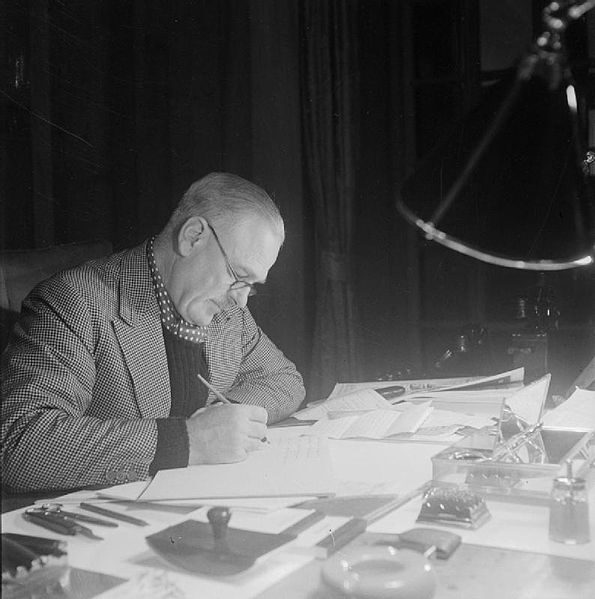
All hopes faded away
When all the possibilities and hopes for a coalition Constituent Assembly faded away, the Prime Minister, Mr Attlee announced on 20 February 1947 that the government wished to implement necessary plans to transfer power to responsible people of India by 8 June 1948.
He stated:
“His Majesty’s Government desire to hand over their responsibility to authorities established by a constitution approved by all parties in India in accordance with the Cabinet Mission plan. But, unfortunately there is at present no clear prospect that such a constitution and such authorities will emerge. The present state of uncertainty is fraught with danger and cannot be indefinitely prolonged. His Majesty’s Government wish to make it clear that it is their definite intention to take the necessary steps to effect the transference of power to responsible Indian hands by a date not later than June 1948. […]
“Although the final transfer of authority may not take place until June 1948, preparatory measures must be put in hand in advance. It is important that the efficiency of the civil administration should be maintained and that the defence of India should be fully provided for. But inevitably, as the process of transfer proceeds, it will become progressively more difficult to carry out to the letter all the provisions of the Government of India Act, 1935. Legislation will be introduced in due course to give effect to the final transfer of power. […]
“His Majesty’s Government cannot conclude this Statement without expressing on behalf of the people of this country their goodwill and good wishes towards the people of India as they go forward to this final stage in their achievement of self-government. It will be the wish of everyone in these islands that notwithstanding constitutional changes, the association of the British and Indian peoples should not be brought to an end; and they will wish to continue to do all that is in their power to further the wellbeing of India.” (The Transfer of Power, Vol. 9, pp. 773-775)
Sir Zafrulla Khanra states:
“After the final failure of the Cabinet Mission Plan in December, 1946, the Labour Government in England, and the Prime Minister, Mr Attlee, were faced with the problem of what to do about India’s progress towards independence. Mr Attlee came to the conclusion that after the failure of this last effort, directed towards the maintenance of the political unity of the subcontinent, there was no choice left but to agree to partition and to carry it out. So, in February, 1947, he announced his decision on partition in principle. The central point of the announcement was that His Majesty’s Government would transfer power to the provincial governments that were then in power, and through them a scheme of partition would be worked out.” (The Reminiscences of Sir Muhammad Zafrulla Khan, pp. 141-142)
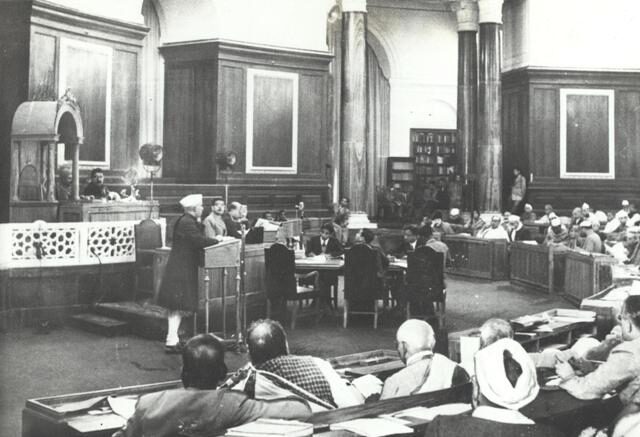
He stated at another instance:
“It can be surmised that either the Congress was not sincere in accepting the plan in the very first instance or having accepted it realised that they should not have accepted it in the first instance. Thus, instead of owning the responsibility of rejecting the plan, they tried to get rid of it by resorting to interpretations. The history may, one day, enlighten us about this puzzle but the later events proved that the Congress leadership had always used ‘interpretation’ as a convenient tool for resiling from agreements.” (Tehdise Nemat or Recollection of Divine Favours [English], pp. 516-517)
HM Seervai expressed a similar kind of view, and stated:
“The large number of official documents leave no doubt that the Congress was not interested in working the Plan in the spirit in which it was intended to be worked. The Congress opposition to parity and the Congress demand for a Dominion Cabinet, if granted, would have enabled the Congress to get hold of real power over the Government of India as well as over Provincial Governments, leaving the Congress to settle the Hindu-Muslim problem on its own terms. […] The published documents leave no doubt that the Plan was designed to give to the Congress its cherished goal of a united India and to give to the Muslim League the grouping of Muslim Provinces in Sections B and C which it wanted.” (Partition of India: Legend and Reality, Oxford University Press, 2005, p. 68-69)
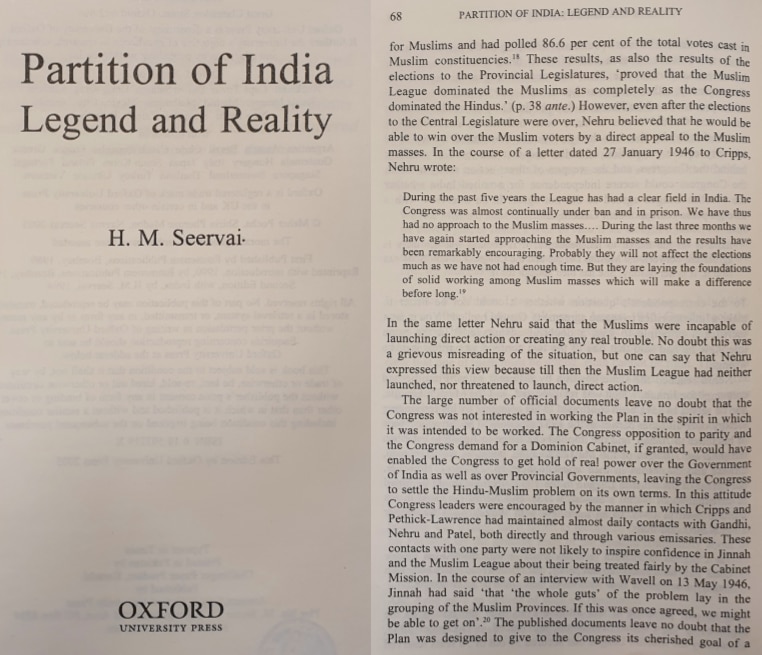
Sir Malik Khizar Hayat Tiwana’s resignation
After the announcement of 20 February 1947, an important incident occurred in shape of Sir Malik Khizar Hayat Tiwana’s resignation from the post of Premier of Punjab on 2 March 1947. Hazrat Sir Chaudhry Muhammad Zafrulla Khanra played a huge role to persuade him.
In regards to this, Hazrat Khalifatul Masih IIra wrote a letter to MA Jinnah on 2 March, and informed him that Sir Zafrulla Khan Sahibra had succeeded in persuading Malik Khizar Hayat Tiwana to resign from his post. (Jinnah Papers, Vol. 1, Part I, pp. 164-165)
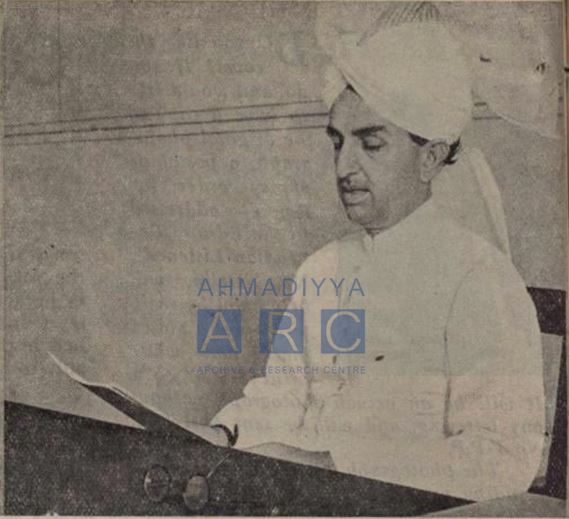
After the resignation, the Congress Working Committee passed a resolution during its session held on 6-8 March 1947 that Punjab should be divided into Muslim and non-Muslim Punjab and on 4 April, it was announced on All India Radio that the government was considering such suggestion.
Upon this, Hazrat Musleh-e-Maudra sent a telegram to the Viceroy of India, in which he stated that he and his Jamaat fully condemned the suggestion of dividing Punjab and especially the suggestion that Central Punjab should be separated from Western Punjab. He added that Muslims had a clear majority in the central parts of Punjab and they deserved the same rights as that of a nation living in any part of the world. (Al Fazl, 17 April 1947, p. 2)
On 22 March 1947, the new Viceroy of India Lord Mountbatten arrived in India.
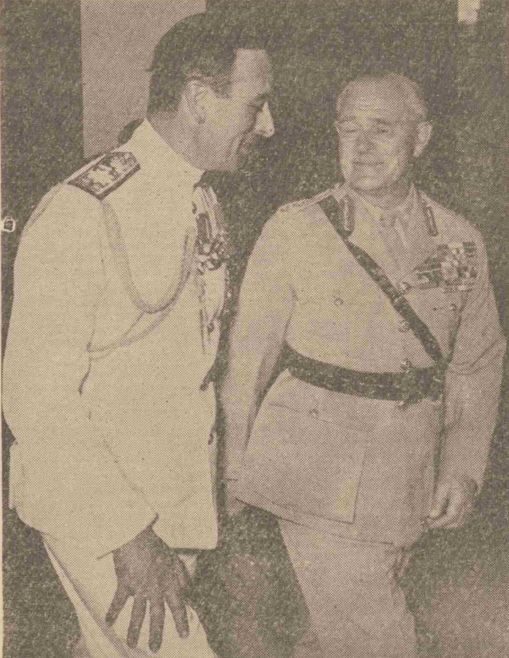
On 1 May 1947, Huzoorra delivered a speech, titled “Hindustani uljhanon ka aasaan tareen hal” (A simple solution to the problems of India). During this speech, he advocated that the people of India deserved the right to determine their future themselves, instead of the foreigners deciding it unilaterally. He also granted valuable guidance in regards to the division of Punjab and the North-West Frontier Province (NWFP). (Anwar-ul-Ulum, Vol. 18, pp. 551-561)
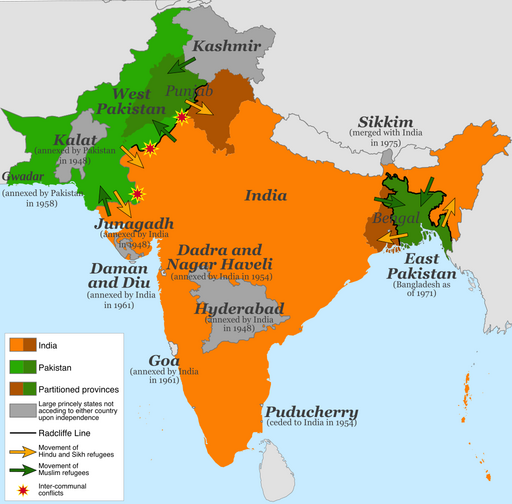
The Sunday Post reported that Huzoorra sent a telegram to Mr Attlee on 24 May 1947:
“The head of the Ahmadya community, a powerful Moslem sect, sent a telegram from Lahore yesterday to Mr Attlee and Mr Churchill strongly protesting against any partition of the Punjab.” (The Sunday Post, 25 May 1947, p. 1)
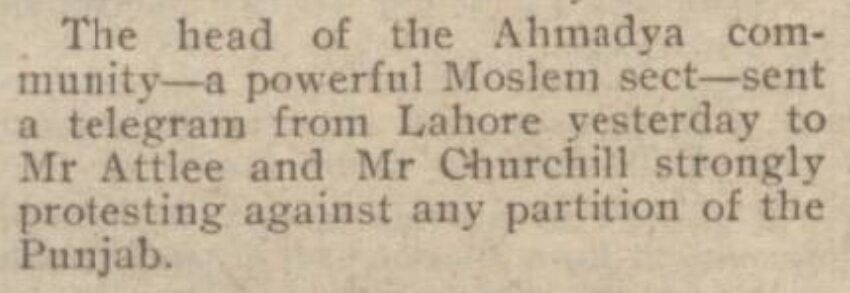
Announcement of Partition
On 3 June 1947, the Prime Minister Mr Attlee stated in the British Parliament:
“On 20th February, 1947, His Majesty’s Government announced their intention of transferring power in British India to Indian hands by June, 1948. His Majesty’s Government had hoped that it would be possible for the major parties to co-operate in the working-out of the Cabinet Mission’s Plan of 16th May 1946, and evolve for India a constitution acceptable to all concerned. This hope has not been fulfilled.” (Hansard, HC Deb 3 June 1947, Vol. 438, cc. 35-46, https://api.parliament.uk/historic-hansard)
Therefore, on the same day, the Viceroy of India Lord Mountbatten and Prime Minister Mr Attlee simultaneously announced the partition of British-India into two independent nations – India and Pakistan.
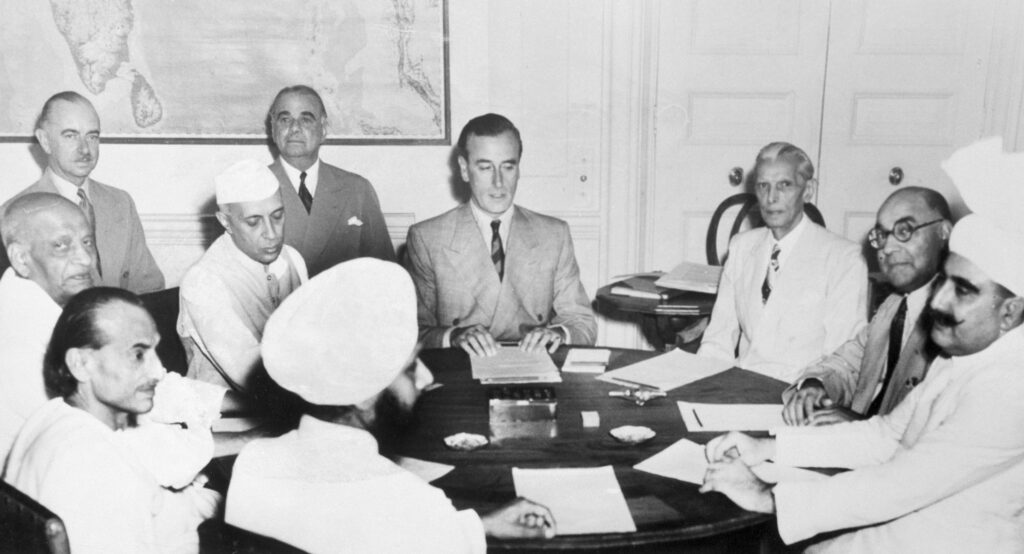
The Times reported under the heading “BROADCAST BY VICEROY”:
“The following is the text of the broadcast which Lord Mountbatten, the Viceroy, made yesterday to the Indian people on the transfer of power to Indian hands:-
“‘A statement will be read to you tonight giving the final decision of his Majesty’s Government as to the method by which power will be transferred from British to Indian hands. But before this happens I want to give a personal message to the people of India, as well as a short account of the discussions which I have held with the leaders of the political parties, and which have led up to the advice I tendered to His Majesty’s Government during my recent visit to London.
“‘Since my arrival in India at the end of March I have spent almost every day in consultation with as many of the leaders and representatives of as many communities and interests as possible. I wish to say how grateful I am for all the information and helpful advice that they have given me. Nothing I have seen or heard in the past few weeks has shaken my firm opinion that with a reasonable measure of good will between the communities a unified India would be far the best solution of the problem. […]
“‘My first course, in all my discussions, was therefore to urge the political leaders to accept unreservedly the Cabinet mission plan of May 16, 1946. In my opinion that plan provides the best arrangement that can be devised to meet the interests of all the communities of India. To my great regret it has been impossible to obtain agreement either on the Cabinet mission plan or on any other plan that would preserve the unity of India. But there can be no question of coercing any large areas in which one community has a majority to live against their will under a Government in which another community has a majority — and the only alternative to coercion is partition. […]
“‘I have faith in the future of India and am proud to be with you all at this momentous time. May your decisions be wisely guided and may they be carried out in the peaceful and friendly spirit of the Gandhi-Jinnah appeal.’” (The Times, 4 June 1947)
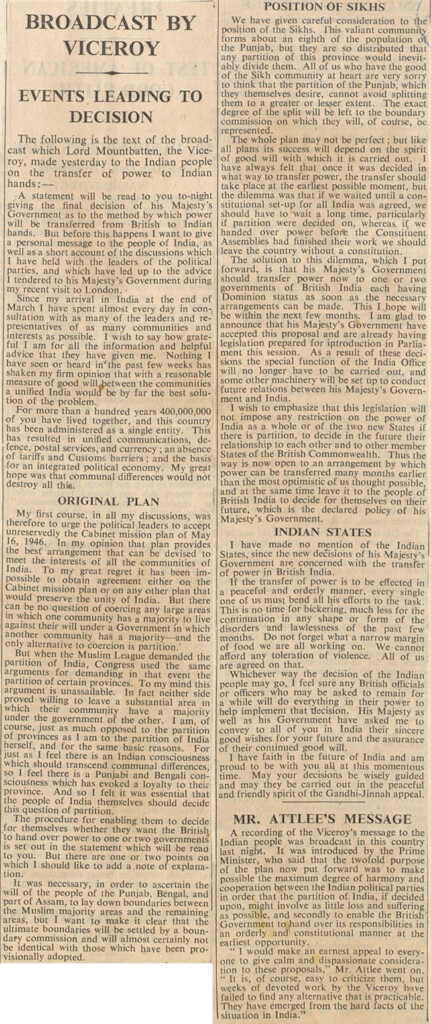
The Times then wrote under the heading “MR ATTLEE’S MESSAGE”:
“A recording of the Viceroy’s message to the Indian people was broadcast in this country last night. It was introduced by the Prime Minister who said that the twofold purpose of the plan now put forward was to make possible the maximum degree of harmony and cooperation between the Indian political parties in order that the partition of India, if decided upon, might involve as little loss and suffering as possible, and secondly to enable the British Government to hand over its responsibilities in an orderly and constitutional manner at the earliest opportunity.
“‘I would make an earnest appeal to everyone to give calm and dispassionate consideration to these proposals’, Mr Attlee went on. ‘It is, of course, easy to criticize them, but weeks of devoted work by the Viceroy have failed to find any alternative that is practicable. They have emerged from the hard facts of the situation in India.’” (Ibid)
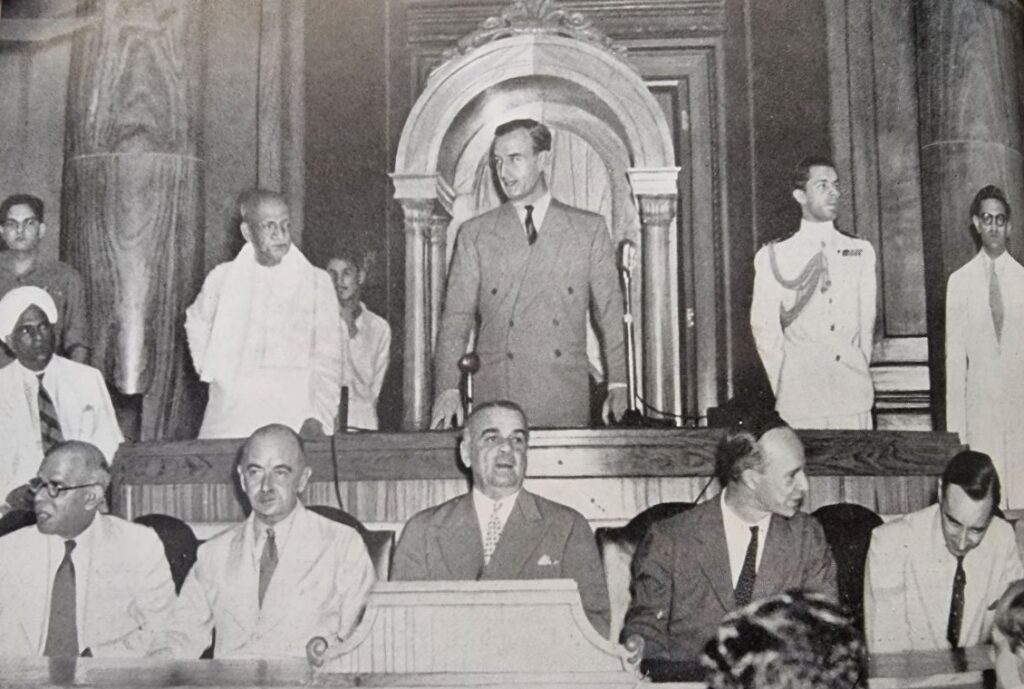
Related Content
- Hazrat Musleh-e-Maud’s services to the Muslim cause: Guiding Muslims of the Indian subcontinent amid religious and political conflicts
- Hazrat Musleh-e-Maud’s response to the Shuddhi movement and the Jamaat’s relentless services for Islam
- The Simon Commission, First Round Table Conference and Hazrat Musleh-e-Maud’s valuable guidance
- Freedom is the birthright of everyone: Hazrat Musleh-e-Maud’s guidance regarding India’s independence and partition
- The Wavell Plan and Hazrat Mirza Bashiruddin Mahmud Ahmad’s (ra) call for peace and India’s freedom
- The Simla Conference, 1945: Hazrat Mirza Bashiruddin Mahmud Ahmad’s (ra) guidance prior to the conference and response to its failure
- The Cabinet Mission, 1946: Its background and Hazrat Mirza Bashiruddin Mahmud Ahmad’s (ra) guidance
- May India and Pakistan live amicably: The Partition of India, 1947 and Hazrat Mirza Bashiruddin Mahmud Ahmad’s heartfelt wish

